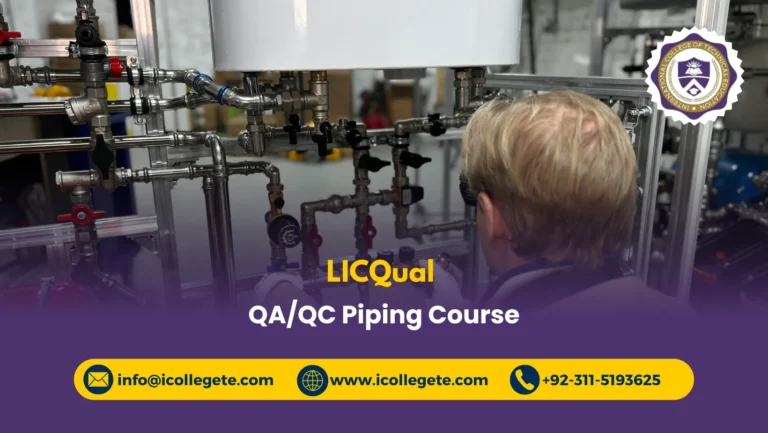Begin your journey into the world of construction quality assurance with the QA/QC Civil Level 3 Course in Rawalpindi, a foundational training program designed for individuals seeking to build practical skills in civil engineering inspection and compliance. QA/QC Civil level 3 Course in Rawalpindi introduces learners to the essential principles of QA/QC in civil works, including site supervision, material testing, documentation, and safety protocols.
Tailored for beginners and early-career technicians, the Level 3 course focuses on real-world applications and industry-relevant knowledge. Participants will learn how to interpret civil drawings, monitor construction activities, and apply basic inspection techniques across structural, concrete, and earthwork operations. The QA/QC Civil level 3 Course in Rawalpindi also emphasizes the importance of quality documentation and adherence to project specifications.
Delivered through structured modules and hands-on sessions, this program prepares learners to assist senior QA/QC engineers, contribute to field inspections, and support quality control processes on active construction sites. By the end of the QA/QC Civil level 3 Course in Rawalpindi, participants will be equipped with the confidence and technical fluency to perform basic QA/QC tasks and pursue further specialization.
Whether you’re entering the construction industry or transitioning from a general technical role, the QA/QC Civil Level 3 Course in Rawalpindi offers a solid foundation for career growth in infrastructure, building, and civil engineering projects.
Course Overview
The QA/QC Civil Level 3 Course in Rawalpindi is an entry-level training program designed to build essential competencies in civil construction inspection and quality control. Structured into six focused study units, the QA/QC Civil level 3 Course in Rawalpindi provides learners with the technical grounding and practical exposure needed to support QA/QC operations in real-world construction environments.
Participants begin by exploring the basics of civil engineering materials, construction methods, and site safety. The QA/QC Civil level 3 Course in Rawalpindi then introduces drawing interpretation, field inspection techniques, and quality documentation practices. Each unit is designed to simulate actual site conditions, helping learners understand how quality assurance is implemented across different phases of civil projects.
QA/QC Civil level 3 Course in Rawalpindi is ideal for matric and intermediate graduates, vocational trainees, and entry-level technicians who want to specialize in civil QA/QC. It also suits individuals preparing for roles in infrastructure development, building construction, and public works. With increasing demand for certified QA/QC professionals in Pakistan’s construction sector, this Level 3 qualification offers a clear pathway to employment and future advancement. By completing all six study units, learners gain the ability to assist in inspections, maintain documentation, and support compliance with engineering standards and safety regulations.
Course Study Units
- Introduction to Civil Engineering Materials and Standards
- Basics of Civil Drawings and Site Layouts
- Field Inspection Techniques for Civil Works
- Concrete Testing and Structural Quality Checks
- Earthwork and Foundation Inspection Procedures
- Quality Documentation and Site Safety Protocols
Learning Outcomes for this course
Understanding Civil Engineering Materials
- Identify commonly used materials such as cement, aggregates, steel, and concrete
- Understand material properties and their role in structural integrity
- Learn basic testing procedures for construction materials
- Recognize quality standards for material selection and usage
- Observe material handling and storage practices on site
- Support documentation of material specifications and test results
- Build awareness of material compliance with project requirements
Interpreting Civil Drawings and Layouts
- Read and interpret basic civil engineering drawings and site plans
- Identify symbols, dimensions, and annotations used in construction layouts
- Understand drawing scales and coordinate systems
- Trace structural elements and utilities from technical diagrams
- Relate drawings to actual site conditions and installations
- Communicate drawing details with supervisors and site teams
- Assist in updating drawings based on field modifications
Conducting Field Inspections
- Perform visual inspections of structural and non-structural elements
- Monitor construction activities for compliance with specifications
- Identify common defects in concrete, masonry, and earthwork
- Use basic inspection tools and checklists during site visits
- Record observations and report inconsistencies
- Support senior QA/QC staff in inspection routines
- Promote adherence to quality standards during execution
Concrete and Structural Quality Checks
- Understand concrete mix design and batching procedures
- Observe formwork, reinforcement, and placement activities
- Identify issues such as honeycombing, segregation, and cracks
- Monitor curing processes and surface finishing techniques
- Document concrete testing results and site observations
- Apply basic acceptance criteria for structural components
- Support compliance with structural safety standards
Earthwork and Foundation Inspection
- Monitor excavation, compaction, and backfilling activities
- Understand soil classification and testing procedures
- Identify issues related to settlement, erosion, and slope stability
- Observe foundation layout and reinforcement placement
- Record inspection data for substructure elements
- Support coordination between civil and geotechnical teams
- Promote safe and compliant foundation practices
Quality Documentation and Safety Protocols
- Learn to fill out inspection forms and daily reports
- Maintain records of material tests and site inspections
- Document non-conformance reports and corrective actions
- Understand basic safety procedures and PPE requirements
- Support permit-to-work and site safety documentation
- Assist in preparing files for audits and client reviews
- Promote consistency and traceability in QA/QC documentation
Entry Requirements for this course
- Age Applicants must be at least 18 years old. This ensures legal eligibility for industrial training and readiness for field-based responsibilities.
- • Education Minimum education requirement is matriculation (Grade 10). Candidates with intermediate or technical diplomas in civil or construction trades are preferred for better comprehension.
- • Experience No prior QA/QC experience is required. However, individuals with basic knowledge of construction, site work, or civil materials will benefit from faster learning and practical application.
- • Language Proficiency Basic understanding of English or Urdu is essential. Learners must be able to read technical documents, interpret drawings, and communicate inspection findings clearly.
- • Physical Fitness Applicants should be physically fit to perform site inspections, handle tools, and work in outdoor environments. Fieldwork may involve climbing, standing, and exposure to weather conditions.
- • Technical Interest Interest in civil engineering, construction, or inspection processes is recommended. Learners should be comfortable with measurements, diagrams, and structured procedures.
- • Safety Awareness Candidates must be willing to follow safety protocols and wear protective gear during practical sessions. Awareness of basic site safety practices is important.
- • Commitment to Learning Regular attendance, active participation, and completion of assignments are required. Learners must be motivated to engage with both theoretical and hands-on training.
Course Benefits of this course
Practical Skills for Construction Inspection
- Learn to inspect civil works including concrete, earthwork, and structural elements
- Understand basic testing procedures for materials and site conditions
- Apply visual inspection techniques during construction activities
- Use checklists and tools to monitor quality on-site
- Record observations and report non-conformities
- Support senior QA/QC engineers in field inspections
- Build confidence in executing inspection tasks independently
- Develop habits of accuracy and procedural discipline
- Gain exposure to real-world construction environments
Career Readiness Across Civil Engineering Sectors
- Qualify for QA/QC roles in infrastructure and building projects
- Enhance your resume with industry-recognized training
- Access job opportunities in public and private construction sectors
- Prepare for entry-level and mid-level inspection positions
- Build transferable skills for civil engineering environments
- Gain credibility in technical support roles
- Align with employer expectations in quality control
- Position yourself for long-term career growth
- Support compliance in government and commercial projects
Foundation for Advanced QA/QC Certifications
- Build readiness for Level 6 QA/QC and specialized civil inspection programs
- Understand core concepts required for structural and material testing
- Prepare for certifications in concrete, soil, and site safety inspection
- Gain exposure to international codes and standards
- Develop technical vocabulary and inspection fluency
- Support documentation for certification pathways
- Strengthen understanding of quality benchmarks
- Establish a clear progression route
- Align with global construction QA/QC practices
Hands-On Experience with Tools and Techniques
- Use measuring instruments for inspection tasks
- Apply visual inspection methods in practical sessions
- Observe concrete testing and soil compaction procedures
- Handle basic inspection equipment safely
- Record inspection data in standard formats
- Support tool calibration and maintenance
- Build familiarity with field equipment
- Practice inspection workflows in simulated environments
- Improve operational readiness for site work
Strong Documentation and Reporting Skills
- Learn to fill out inspection forms and daily reports
- Maintain records of material tests and site inspections
- Document non-conformance reports and corrective actions
- Organize QA/QC files for audits and reviews
- Communicate findings through structured reports
- Support digital documentation systems
- Promote consistency in recordkeeping
- Contribute to transparent project workflows
- Build habits of professional documentation
Safety Awareness and Site Protocols
- Understand basic safety procedures in construction environments
- Use personal protective equipment (PPE) correctly
- Identify hazards related to civil works and inspection activities
- Follow permit-to-work and site safety documentation
- Coordinate with safety teams during inspections
- Promote safe practices in field operations
- Document safety observations accurately
- Support integration of QA/QC and HSE protocols
- Build responsibility in industrial settings
Teamwork and Communication Skills
- Collaborate with engineers, supervisors, and site staff
- Communicate inspection results clearly and professionally
- Support coordination between field and office teams
- Participate in group tasks and technical discussions
- Build interpersonal skills for team-based environments
- Present findings in meetings and review sessions
- Maintain professionalism in written and verbal exchanges
- Strengthen workplace relationships
- Promote effective communication in QA/QC workflows
Local and Global Relevance
- Apply skills in Pakistan’s construction and infrastructure sectors
- Align training with international QA/QC standards
- Support migration goals with recognized certification
- Work with multinational companies and joint ventures
- Understand global inspection practices and expectations
- Build adaptability across diverse work environments
- Enhance employability in overseas inspection roles
- Contribute to quality assurance in global supply chains
- Stay competitive in international job markets
Business and Freelance Potential
- Offer QA/QC services to contractors and small firms
- Build a portfolio of inspection projects and reports
- Market services to construction companies and consultants
- Provide documentation support for audits and certifications
- Deliver training workshops for junior technicians
- Develop templates and tools for quality documentation
- Expand into niche areas like concrete audits or site safety coordination
- Establish a consultancy brand in civil QA/QC
- Scale operations with remote and on-site service models
Long-Term Career Development
- Build a foundation for supervisory QA/QC roles
- Prepare for specialization in structural, geotechnical, or material inspection
- Support continuous improvement in construction quality systems
- Align with evolving standards and technologies
- Contribute to project integrity and operational safety
- Gain recognition as a reliable inspection professional
- Position yourself for promotions and leadership roles
- Stay relevant in competitive technical fields
- Develop a lifelong career in civil quality assurance
Who Should Enroll in this course
- Matric and Intermediate Graduates Students who have completed Grade 10 or 12 and want to enter the construction industry with practical QA/QC skills.
- Fresh Technical Diploma Holders Individuals with DAE in civil, architecture, or construction trades seeking foundational QA/QC training.
- Entry-Level Site Technicians Workers involved in basic site activities who want to understand inspection procedures and quality standards.
- Construction Helpers and Assistants Personnel supporting civil works who wish to formalize their skills and grow into inspection roles.
- General Laborers Seeking Career Growth Individuals with basic site experience aiming to transition into structured technical roles with better pay and stability.
- Unemployed Youth with Technical Interest Job seekers who are technically inclined and want to pursue a career in civil quality control.
- Helpers in Infrastructure Projects Support staff working on roads, bridges, or buildings who want to understand QA/QC basics.
- Safety Assistants Seeking Cross-Training HSE personnel who want to expand their understanding of inspection and quality documentation.
- Junior Masons and Concrete Workers Tradespeople who want to learn how their work is inspected and documented for compliance.
- Vocational Training Graduates Learners from trade schools who want to specialize in civil inspection and quality assurance.
- QA/QC Interns and Trainees Entry-level staff in QA/QC departments who need structured training to advance professionally.
- Individuals Preparing for Gulf Jobs Candidates targeting overseas employment where basic QA/QC certification is a hiring requirement.
- Site Clerks and Document Controllers Administrative staff who manage inspection records and want to understand field procedures.
- Technical Support Staff in Engineering Firms Employees assisting engineers who want to build inspection knowledge for better coordination.
- Freelancers Offering Civil Services Independent workers who want to add QA/QC capabilities to their service portfolio.
- Small Contractors and Subcontractors Business owners who want to ensure their work meets client quality expectations.
- Maintenance Technicians in Civil Facilities Workers involved in repairs who need to understand inspection criteria and documentation.
- Surveyors and Field Assistants Professionals involved in layout and measurements who want to understand QA/QC integration.
- Individuals Interested in Technical Compliance Learners who want to contribute to quality assurance and regulatory documentation in civil settings.
- Anyone Seeking a Stable Technical Career Path Motivated individuals looking for a reliable, skill-based profession with long-term growth potential.
Future Progression of this course
Advancement to QA/QC Civil Level 6
- Enroll in Level 6 to gain advanced inspection and documentation skills
- Learn to manage complex QA/QC workflows on large-scale civil projects
- Understand international codes such as ASTM, ACI, and ISO
- Apply advanced testing methods for concrete, soil, and materials
- Prepare for supervisory roles in QA/QC departments
- Build expertise in compliance and audit preparation
- Support infrastructure projects with higher technical responsibility
- Strengthen career prospects in public and private sectors
- Position yourself for long-term leadership in quality control
Concrete Testing and Certification
- Learn advanced concrete mix design and testing procedures
- Understand destructive and non-destructive testing methods
- Apply standards for slump, compressive strength, and curing inspections
- Document concrete quality results for structural compliance
- Prepare for certification in concrete field testing
- Work in labs, construction sites, and quality departments
- Build specialization in concrete QA/QC roles
- Support concrete audits and compliance reviews
- Align with international concrete testing standards
Soil and Earthwork Inspection Specialization
- Advance into soil classification and compaction testing roles
- Monitor excavation, backfilling, and slope stability procedures
- Understand geotechnical testing and reporting formats
- Support foundation inspections and subgrade evaluations
- Prepare for roles in roadwork and infrastructure QA/QC
- Document earthwork activities for compliance and safety
- Coordinate with geotechnical engineers and site teams
- Build expertise in soil quality assurance
- Contribute to safe and durable civil structures
Structural QA/QC and Site Supervision
- Inspect reinforcement, formwork, and structural concrete placement
- Monitor compliance with structural drawings and specifications
- Identify defects in beams, columns, slabs, and load-bearing elements
- Support structural testing and documentation
- Coordinate with site engineers and contractors
- Ensure safety and quality during structural execution
- Prepare reports for structural audits and reviews
- Build readiness for supervisory roles on construction sites
- Contribute to structural integrity and project success
Quality Documentation and Audit Preparation
- Develop structured documentation systems for QA/QC records
- Prepare inspection logs, NCRs, and material traceability reports
- Organize files for client handover and regulatory audits
- Support digital documentation platforms and cloud-based systems
- Maintain version control and document integrity
- Align documentation with ISO and project-specific standards
- Assist in audit readiness and compliance reviews
- Build expertise in document formatting and reporting
- Contribute to transparent and traceable project workflows
Entry into Infrastructure QA/QC Roles
- Work on roads, bridges, dams, and public works projects
- Apply inspection techniques to large-scale civil installations
- Understand safety and compliance in high-impact environments
- Support QA/QC operations during project execution and handover
- Document inspections for regulatory and client review
- Coordinate with multidisciplinary teams and consultants
- Build specialization in infrastructure quality control
- Align with national and international construction standards
- Prepare for long-term roles in government and private infrastructure
Freelance and Consultancy Opportunities
- Offer QA/QC services to contractors and civil firms
- Build a portfolio of inspection projects and reports
- Market services to construction companies and consultants
- Provide documentation support for audits and certifications
- Deliver training workshops for junior technicians
- Develop templates and tools for quality documentation
- Expand into niche areas like concrete audits or site safety coordination
- Establish a consultancy brand in civil QA/QC
- Scale operations with remote and on-site service models
Technical Sales and Support Roles
- Transition into technical sales for QA/QC equipment and software
- Demonstrate inspection tools and systems to clients
- Prepare proposals and documentation for quality solutions
- Support client onboarding and training in QA/QC systems
- Collaborate with engineering and procurement teams
- Build relationships with industrial buyers and project managers
- Provide after-sales support and troubleshooting
- Align product offerings with client quality requirements
- Grow into business development roles in construction technology
International Employment Pathways
- Align skills with global QA/QC standards and job requirements
- Prepare for certifications like ACI, ASTM, or ISO-based QA/QC roles
- Build documentation portfolios for overseas job applications
- Connect with recruiters and inspection firms abroad
- Gain cultural readiness for international roles
- Serve diverse environments across regions and industries
- Increase earning potential through global mobility
- Contribute to international infrastructure projects
- Position yourself for success in global QA/QC careers
Continuous Professional Development
- Attend workshops and seminars on civil QA/QC advancements
- Stay updated with evolving construction codes and standards
- Participate in industry conferences and technical forums
- Subscribe to QA/QC publications and journals
- Network with professionals in quality assurance fields
- Engage in online courses and micro-certifications
- Build a habit of lifelong learning and skill enhancement
- Contribute to innovation in construction quality practices
- Maintain relevance in a competitive technical landscape
Conclusion
The QA/QC Civil Level 3 Course in Rawalpindi offers more than technical instruction—QA/QC Civil level 3 Course in Rawalpindi cultivates a mindset of precision, responsibility, and professional discipline. Designed for those ready to step into the world of construction quality assurance, QA/QC Civil level 3 Course in Rawalpindi encourages learners to think critically about the built environment and their role in maintaining its integrity.
What sets QA/QC Civil level 3 Course in Rawalpindi apart is its emphasis on readiness. QA/QC Civil level 3 Course in Rawalpindi doesn’t just teach procedures—QA/QC Civil level 3 Course in Rawalpindi prepares individuals to respond to real-world challenges with clarity and confidence. Learners develop the ability to observe, record, and communicate quality-related issues in a way that supports safe, compliant, and efficient project execution.
QA/QC Civil level 3 Course in Rawalpindi also fosters adaptability, helping participants understand how quality control fits into diverse civil engineering contexts—from small residential builds to large infrastructure projects. It’s a launchpad for those who want to grow into roles that demand both technical fluency and professional accountability.
Whether you’re entering the workforce or seeking a structured path into civil QA/QC, QA/QC Civil level 3 Course in Rawalpindi offers a clear direction. It’s not just about learning how to inspect—it’s about becoming someone who ensures that every structure stands on a foundation of quality.





